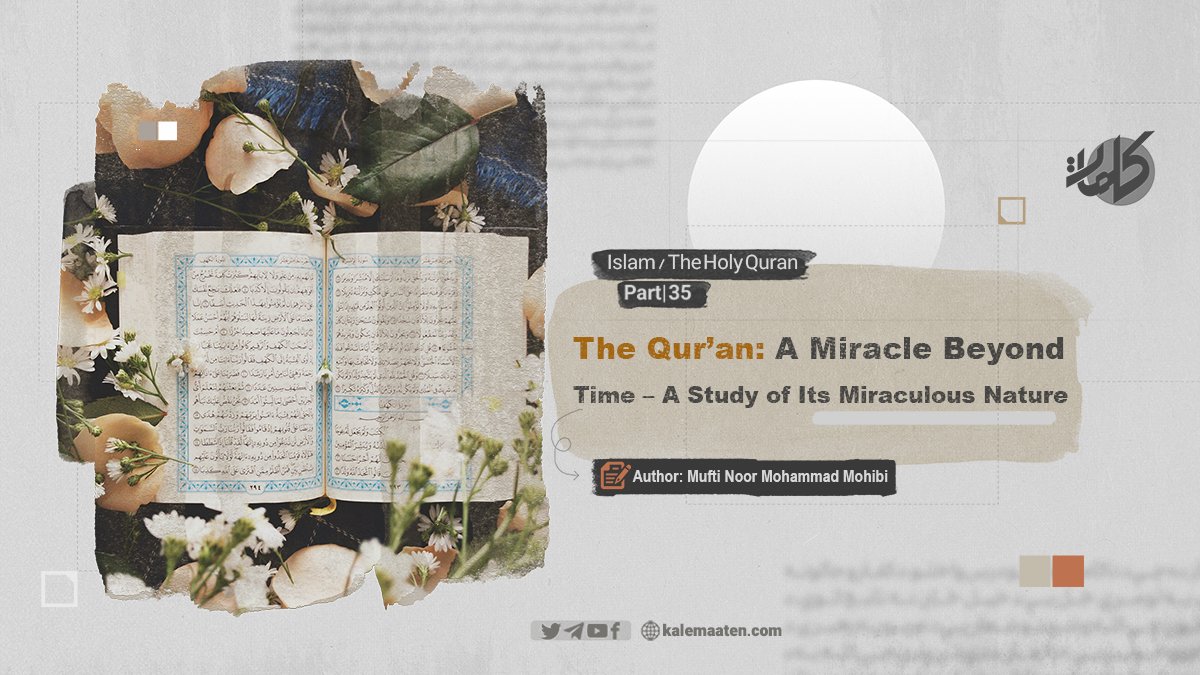
Author: Mufti Noor Mohammad Mohibi
The Quran: A Miracle Beyond Time – A Study of Its Miraculous Nature (part 35)
The Connection between looking, Sharia and Health
One of the great blessings of Allah is the “power of sight”; a tool that can take a person to the heaven of knowledge or throw him into the abyss of destruction. If the looking is not properly guided, it will be a gateway to “destructive physical, psychological and moral stimulants.” In Islamic teachings, the command to «غضّ بصر» meaning: “not looking a non-mahram” is given with great emphasis; but what is surprising are the new scientific discoveries that have a “strange correspondence” with these Sharia commands.
The biological mechanism of sexual arousal through looking
When a man looks at a non-mahram woman, and especially “repeatedly looking”, a series of chemical and hormonal reactions in the body begin, which is like “pulling the trigger of a weapon”:
-
Secretion of “sex hormones” throughout the body
-
Increased heart rate
-
Dilation of superficial veins and narrowing of the middle veins
-
Increased blood pressure
-
Stimulation of the prostate,
-
Closure of the urinary tract and opening of the semen route
-
Secretion of “aromatic, nutritious and disinfectant” substances for sexual readiness
-
Changes in “blood chemistry” to prepare the body for sexual intercourse and reproduction.
If these reactions are placed within their natural framework (legitimate and purposeful relationship), they serve the survival of the generation; but “leaving sight” in environments contaminated with indecency disrupts this precise system.
Warning from the Quran and Sunnah
Allah Almighty says in the Quran: ﵟقُل لِّلۡمُؤۡمِنِينَ يَغُضُّواْ مِنۡ أَبۡصَٰرِهِمۡ وَيَحۡفَظُواْ فُرُوجَهُمۡۚ ذَٰلِكَ أَزۡكَىٰ لَهُمۡۚ إِنَّ ٱللَّهَ خَبِيرُۢ بِمَا يَصۡنَعُونَ ﵞ Translation: “(O Prophet!) Tell the believing men to lower their gaze and guard their private parts. That is more honorable for them and more honorable. Indeed, Allah is Aware of what they do.” [A-Nour: 30]
«ازکى» literally means purer and healthier; both spiritually (purity from sin) and physically (physical health).
The Messenger of Allah (peace and blessings of Allah be upon him) also said: “النظرة سهم من سهام إبليس مسمومة فمن تركها من خوف الله أثابه جل وعز إيمانا يجد حلاوته في قلبه» هذا حديث صحيح الإسناد ولم يخرجاه.” Translation: “Looking (at a non-mahram) is like a poisoned arrow from the arrows of Satan. Whoever does not look at him out of fear of Allah, Allah will grant him faith that will make his heart feel sweet”. [1]
Scientific research on looking and physical health
A scientific study with a history of twenty years states that continuous looking at a non-mahram is associated with “constant circulation of sex hormones in the blood.” In today’s contemporary society, where limitless relationships and visual indecency are common, this cycle leads to many damages:
A: Primary damages:
-
Bad smell in the armpits and feet
-
Increased secretions of sweat and sebaceous glands in the feet and buttocks
-
The occurrence of hemorrhoids due to irritation and inflammation of the genital area
-
The development of facial pimples (acne) [2] due to increased fat and hormones
-
Chronic headaches or migraines due to hormonal excitement
B: Joint damages:
-
Reduced viscosity of the joint fluid between the bones
-
Bone friction and wear
-
Severe pain in the knee, hip and other large joints
C: Cardiovascular damages:
-
Slowing of the heart rate
-
Possibility of blood clots
-
Reduced flexibility of the arteries and atherosclerosis
-
Diseases such as “high blood pressure”, stroke and heart disease
Hormones: Limited medicine, high poison
Just as snake venom is a medicine in low doses, “sex hormones” are also beneficial in normal amounts; but their continuous secretion without physiological consumption becomes an “internal poison” that threatens the overall health of the body.
Clear signs of hormone toxicity
-
Unpleasant body smell
-
Chronic constipation (with more than 50 related diseases)
-
Heavy tongue and difficulty in speaking
-
Gallstones
-
Premature prostate enlargement
-
Nervous, memory and vision disorders (in severe cases: blindness, paralysis, insanity)
In some medical reports in Western societies, young people in their thirties have suffered from “joint wear and tear”; for no apparent reason other than endless sexual arousal.
Preventive Measures in the Prophetic Sunnah
Islamic law has carefully presented a set of “preventive commands” in this regard:
-
Prohibition of looking at non-mahram for the second time
-
Prohibition of adornment (revealing adornment by women)
-
Prohibition of women using perfume outside
-
Prohibition of solitude with non-mahram
-
Prohibition of flirting with non-mahram women
-
Recommendation for a legitimate and regular marital relationship
All these commands are to protect the human body and soul from the “hidden but deep harm” of unbridled lust.
The wisdom of Sharia law is human health
Islam has established not looking at non-mahram not as a restriction, but rather to “protect human health.” Whenever science unveils the wisdom of the Sharia law, human faith is strengthened. Allah, the Exalted, says: “لِيَزدَادُوٓاْ إِيمَٰنا مَّعَ إِيمَٰنِهِمۗ” Translation: “That they may increase their faith (and strengthen their certainty and belief).” [Al-Fath: 4]
How beautifully the poet has composed:
يا رامياً بِسِهَامِ اللّحْظِ مُجْتَهِداً
أنتَ القَتِيلُ بِما تَرْمِي فَلَا تُصِبِ
وباعثَ الطَّرْفِ يَرتادُ الشِّفَاءَ لَهُ
احبِسْ رَسُولَكَ لا يَأتِيكَ بِالعَطَبِ
Translation: “O you who strive with the arrow of your looking, you yourself will be killed by what you throw, not by hitting the target!
And you who send your eye in the hope of healing, Withhold what you sent, lest it lead you to destruction”.
These meaningful verses warn that an impious looking not only does not bring any benefit, but also leads to harm and destruction; just as the arrow of a looking hits the one who throws it before it reaches another. [3]
Continues…
References:
- Al-Mustadrak `ala al-Sahihain, Book of Asceticism, Hadith No. 7875, Vol. 4, p. 349.
- is a type of skin disease.
- Encyclopedia of Scientific Miracles in the Qur’an and Sunnah, Vol. 1, pp. 126-129.



